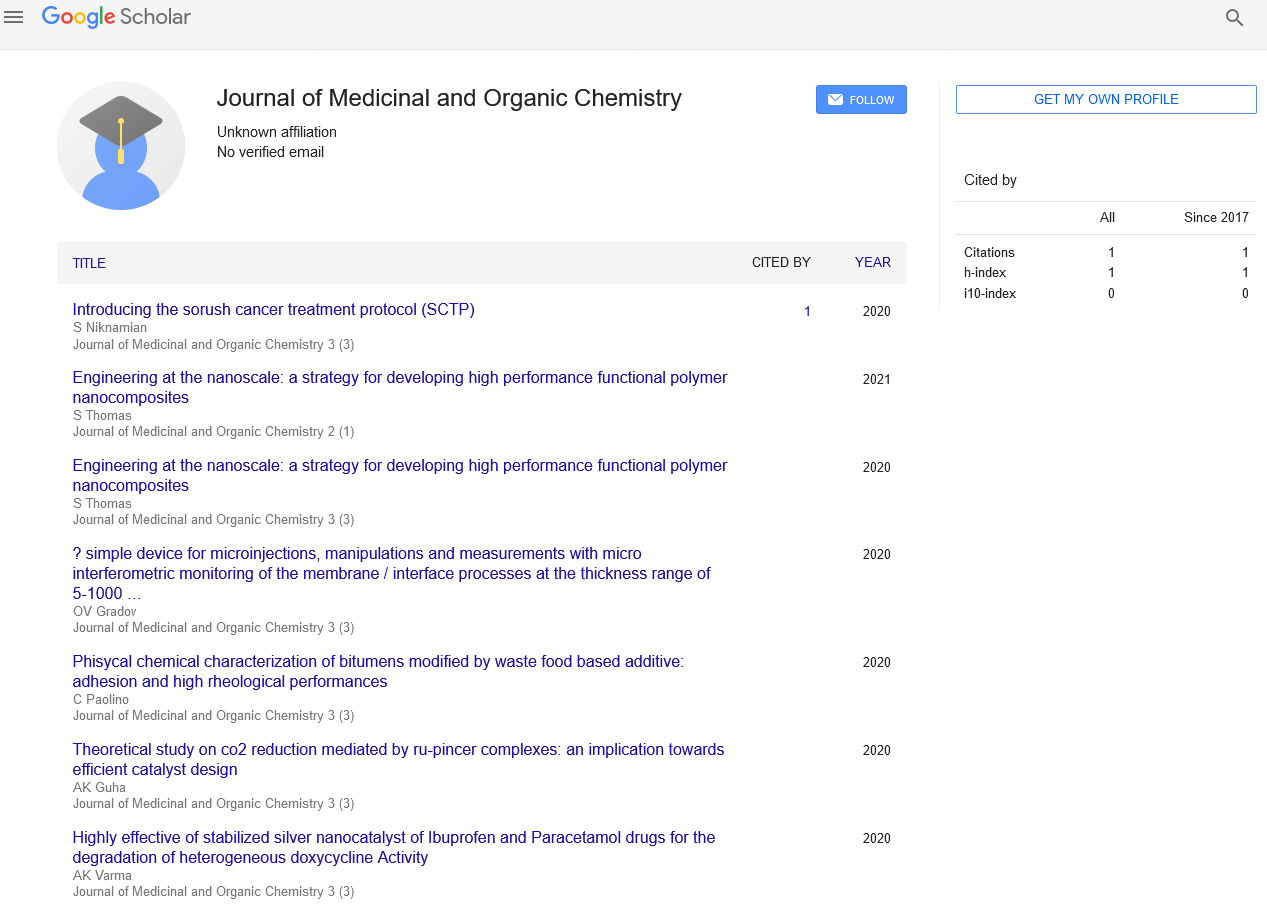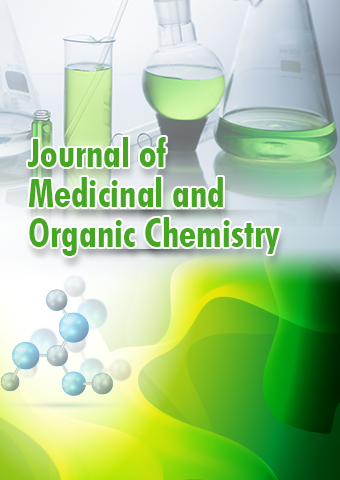Perspective - Journal of Medicinal and Organic Chemistry (2024) Volume 7, Issue 2
Exploring the Intersection of Chemistry and Medicine: The Intriguing World of Medicinal Chemistry
- Corresponding Author:
- Richard Cooker
Department of Biological Science,
University of Mexarosic,
Chicago,
USA
E-mail: richcooker@hotmail.com
Received: 07-Mar-2024, Manuscript No. jmoc-24-129076; Editor assigned: 12-Mar-2024, PreQC No. jmoc-24-129076 (PQ); Reviewed: 26-Mar-2024, QC No. jmoc-24-129076; Revised: 11-Apr-2024, Manuscript No. jmoc-24-129076 (R); Published: 18-Apr-2024, DOI: 10.37532/jmoc.2024.7(2).189-190
Introduction
Medicinal chemistry, at the crossroads of chemistry and medicine, represents a dynamic field dedicated to the discovery, design, and development of therapeutic agents to combat diseases and improve human health. With roots dating back to ancient civilizations’ use of natural remedies, medicinal chemistry has evolved into a sophisticated discipline that harnesses the principles of chemistry, biology, and pharmacology to create life-saving drugs and treatments. In this comprehensive exploration of medicinal chemistry, we delve into its foundational principles, innovative approaches, and transformative impact on healthcare.
Description
The foundations of medicinal chemistry: From molecules to medicines
At its core, medicinal chemistry focuses on understanding the Structure-Activity Relationships (SAR) of biologically active molecules, elucidating how chemical structures influence their interactions with biological targets and therapeutic efficacy. By leveraging the principles of organic chemistry, biochemistry, and pharmacology, medicinal chemists design and optimize molecules to modulate specific biological processes underlying diseases.
Drug discovery and development encompass a multidisciplinary approach, integrating insights from molecular biology, computational chemistry, and pharmacokinetics to identify promising drug candidates and optimize their pharmacological properties. From natural product isolation to synthetic chemistry and high-throughput screening, medicinal chemists employ a diverse array of techniques and methodologies to uncover novel therapeutic agents and optimize their efficacy, safety, and pharmacokinetic profiles.
Innovative approaches in medicinal chemistry: Targeted therapies and precision medicine
Recent advances in molecular biology and genomics have revolutionized drug discovery and personalized medicine, enabling the development of targeted therapies tailored to individuals’ genetic makeup and disease characteristics. Target-based drug discovery, which focuses on identifying and modulating specific molecular targets implicated in disease pathways, has led to the discovery of groundbreaking therapies for cancer, autoimmune diseases, and genetic disorders.
Moreover, the advent of precision medicine tailoring treatments based on patients’ genetic, molecular, and clinical characteristics promises to revolutionize healthcare by optimizing treatment outcomes and minimizing adverse effects. By leveraging genomic sequencing, biomarker analysis, and computational modeling, medicinal chemists can identify patient-specific drug targets and design customized therapies that maximize efficacy and minimize toxicity.
Emerging trends in medicinal chemistry: Biologics, nanomedicine, and drug delivery
In addition to small molecule drugs, medicinal chemistry encompasses the development of biologics large, complex molecules such as proteins, antibodies, and nucleic acids for therapeutic applications. Biologics offer unique advantages, including high specificity, potency, and biocompatibility, making them ideal candidates for targeting disease pathways with precision and efficacy. Nanomedicine, another burgeoning area of medicinal chemistry, harnesses the unique properties of nanoparticles and nanomaterials for drug delivery, imaging, and theranostics (combined therapy and diagnostics). Nanoparticle-based drug delivery systems enable targeted delivery of therapeutic agents to specific tissues or cells, enhancing drug efficacy, reducing side effects, and overcoming biological barriers such as the blood-brain barrier.
The impact of medicinal chemistry on healthcare: Transforming lives and improving outcomes
The impact of medicinal chemistry on healthcare cannot be overstated, with countless lives saved and diseases conquered through the discovery and development of lifesaving drugs and treatments. From antibiotics and antivirals that combat infectious diseases to anticancer agents and immunotherapies that target tumors, medicinal chemistry has revolutionized disease treatment and management across a wide spectrum of medical conditions.
Moreover, medicinal chemistry plays a pivotal role in addressing unmet medical needs, driving innovation in areas such as rare diseases, neurodegenerative disorders, and emerging infectious diseases. By leveraging cutting-edge technologies and interdisciplinary collaborations, medicinal chemists continue to push the boundaries of drug discovery and development, paving the way for novel therapeutics that address the most pressing healthcare challenges of our time.
Challenges and opportunities in medicinal chemistry: Drug resistance, safety, and sustainability
Despite its transformative impact on healthcare, medicinal chemistry faces numerous challenges, including drug resistance, safety concerns, and sustainability issues. The emergence of antimicrobial resistance, for example, poses a significant threat to global health, underscoring the need for novel antibacterial agents and strategies to combat drug-resistant pathogens. Furthermore, ensuring the safety and efficacy of medicinal products requires rigorous preclinical and clinical testing, as well as vigilant monitoring of adverse effects and drug interactions. With growing concerns about environmental pollution and drug waste, sustainable drug design and manufacturing practices are also gaining prominence, emphasizing the importance of green chemistry principles and eco-friendly processes in drug development.
Conclusion
In conclusion, medicinal chemistry represents a fascinating intersection of chemistry and medicine, driving innovation in drug discovery, development, and personalized medicine. From targeted therapies and precision medicine to nanomedicine and biologics, medicinal chemistry offers a wealth of opportunities to address global health challenges and improve patient outcomes. As we continue to unravel the mysteries of disease and develop innovative treatments, let us harness the power of medicinal chemistry to create a healthier, more resilient future for all.

